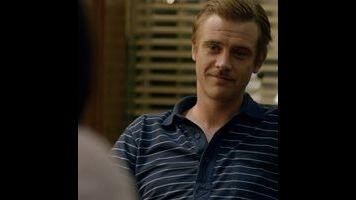In Narcos’ second episode, Pablo kills with a song in his heart

“Cambalache” is bookended by a pair of horrifically violent scenes, set to the same deceptively upbeat song. Sung both times here in a famous version by Julio Sosa, “Cambalache” is a tango. Sosa’s boisterous rendition is just right as something Pablo Escobar would belt out in the shower, and would dance to with wife Tata, its cheery-sounding rhythm irresistible and playful. That both these sequences alternate innocuous domestic scenes with horrific violence away from the Escobar home makes sense once you look at the lyrics, however. Written as a protest against the rampant government corruption and violence in 1930s Argentina, the song (whose title translates to “Junk Shop”) is a fatalistic cry of disgust and moral relativism, its bouncy beat obscuring the sentiment that there is no good in the world, and, in order to survive, you must abandon the idea that there is.
In the opening scene, Pablo croons, confidently off-key, while Quica and his men (driven by a horrified Limon) brutally gun down the prostitutes they suspect gave up Quica’s location to the DEA. One desperate, doomed woman pleads for her life by telling Quica it must have been Limon’s innocent friend Maritza who snitched, before Quica shoots her in the head. (Diego Cataño continues to make Quica absolutely terrifying in his utter indifference to human life, although he does take a moment to psych himself up before killing this woman who, we saw last episode, he’s been sleeping with regularly.)
In the final scene, Pablo—having set out to avenge both President Gaviria’s unwillingness to negotiate Pablo’s return to La Catedral and the government’s recent raid on Pablo’s family—wakes Tata and beckons his wife to dance. They tango to “Cambalache” in their new home while his men carry out a defiantly bloody massacre of the police who’ve been scouring Medellín in order to capture him. In the first scene, there was a hint of conflict in Pablo’s demeanor—after exiting the shower and lighting up his first joint of the day, he glowers moodily while his murderous intentions are carried out. In this second scene, he is as loose and playfully sexy as we’ve ever seen him, pulling Tata in close and sharing a loving, seemingly carefree moment while the bodies pile up in the streets below.
Others have pointed out that there are echoes of the famous The Godfather baptism scene in these sequences, and they’re not wrong, the lovely music and Pablo’s domestic routine clashing with shots of his murderous will being enacted by his minions. But, as has been the case throughout Narcos, there’s less conflict in Pablo Escobar than in Michael Corleone. For Michael, the murder of his enemies—carried out during his nephew’s baptism, for maximum irony—was him irrevocably conceding his soul. For Narcos’ Pablo Escobar, these are just two more days in a life where that decision was made long ago. Or one where there was never a choice made at all.
“Cambalache” points up again how building a series around a monster has its limitations. Wagner Moura is rightly praised for his performance as Pablo Escobar. When the lists are drawn, he deserves a place alongside the likes of Tony Soprano, Walter White, and the rest of the most compelling TV antiheroes of all time. Perhaps hampered by the need to retain verisimilitude to the truly terrifying rap sheet of the real Escobar, there’s only so far Narcos can go to make its main character (apologies to Boyd Holbrook, whose Steve Murphy remains a wan and distant second place) into a relatable human being.
Perhaps the song that forms this episode’s title is the key. In Narcos’ Colombia, and in the world of “Cambalache”’s lyrics (in translation):
Yes, our age is like a junk shop,
 Keep scrolling for more great stories.
Keep scrolling for more great stories.
